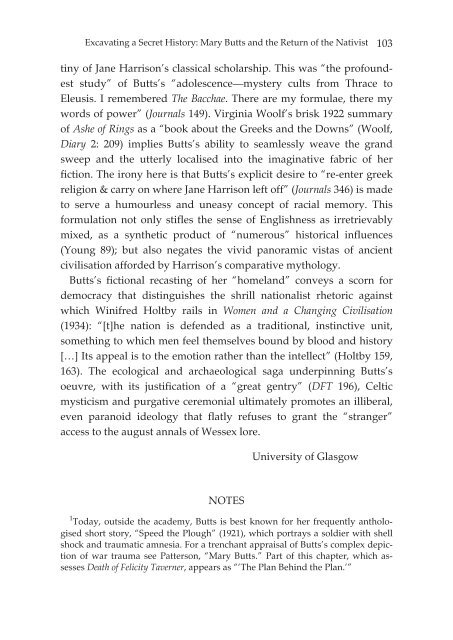This Article as pdf - Connotations
This Article as pdf - Connotations
This Article as pdf - Connotations
You also want an ePaper? Increase the reach of your titles
YUMPU automatically turns print PDFs into web optimized ePapers that Google loves.
Excavating a Secret History: Mary Butts and the Return of the Nativist<br />
tiny of Jane Harrison’s cl<strong>as</strong>sical scholarship. <strong>This</strong> w<strong>as</strong> “the profoundest<br />
study” of Butts’s “adolescence—mystery cults from Thrace to<br />
Eleusis. I remembered The Bacchae. There are my formulae, there my<br />
words of power” (Journals 149). Virginia Woolf’s brisk 1922 summary<br />
of Ashe of Rings <strong>as</strong> a “book about the Greeks and the Downs” (Woolf,<br />
Diary 2: 209) implies Butts’s ability to seamlessly weave the grand<br />
sweep and the utterly localised into the imaginative fabric of her<br />
fiction. The irony here is that Butts’s explicit desire to “re-enter greek<br />
religion & carry on where Jane Harrison left off” (Journals 346) is made<br />
to serve a humourless and une<strong>as</strong>y concept of racial memory. <strong>This</strong><br />
formulation not only stifles the sense of Englishness <strong>as</strong> irretrievably<br />
mixed, <strong>as</strong> a synthetic product of “numerous” historical influences<br />
(Young 89); but also negates the vivid panoramic vist<strong>as</strong> of ancient<br />
civilisation afforded by Harrison’s comparative mythology.<br />
Butts’s fictional rec<strong>as</strong>ting of her “homeland” conveys a scorn for<br />
democracy that distinguishes the shrill nationalist rhetoric against<br />
which Winifred Holtby rails in Women and a Changing Civilisation<br />
(1934): “[t]he nation is defended <strong>as</strong> a traditional, instinctive unit,<br />
something to which men feel themselves bound by blood and history<br />
[…] Its appeal is to the emotion rather than the intellect” (Holtby 159,<br />
163). The ecological and archaeological saga underpinning Butts’s<br />
oeuvre, with its justification of a “great gentry” (DFT 196), Celtic<br />
mysticism and purgative ceremonial ultimately promotes an illiberal,<br />
even paranoid ideology that flatly refuses to grant the “stranger”<br />
access to the august annals of Wessex lore.<br />
NOTES<br />
University of Gl<strong>as</strong>gow<br />
1 Today, outside the academy, Butts is best known for her frequently anthologised<br />
short story, “Speed the Plough” (1921), which portrays a soldier with shell<br />
shock and traumatic amnesia. For a trenchant appraisal of Butts’s complex depiction<br />
of war trauma see Patterson, “Mary Butts.” Part of this chapter, which <strong>as</strong>sesses<br />
Death of Felicity Taverner, appears <strong>as</strong> “‘The Plan Behind the Plan.’”<br />
103
















